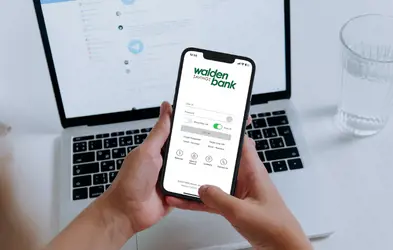Signs of a Scam - What you Need to Know
We have been made aware of recent “spoofing” reports in and around our community. Spoofing occurs when an individual disguises their identity in an attempt to obtain information from you.
These attempts may be made via texts, e-mail or phone calls. Some fraudulent callers even mask their phone number to make the call appear that it is coming from a trusted source like your local police and fire department, the Internal Revenue Service, the Social Security Administration or even Walden Savings Bank!
As a reminder, we will never contact you requesting your personal information including:
- Social Security Number
- Date of Birth
- Debit Card PIN
- User Name/ Password
- Mother’s Maiden Name
- Secure Codes Sent To Your Phone or E-mail
- Instructing You How to Respond to a Potential Fraud Alert
Should you be contacted via phone, text or email by anyone claiming to represent Walden Savings Bank, please do not share any of your personal information. Instead we encourage you to contact us directly through our verified contact information available on here the Walden Savings Bank website.
Where to go for help
If you believe that your personal information or any of your electronic devices have been compromised, it is important that you take immediate action. A good first step would be to contact the Walden Savings Bank team. We can assist you by putting additional safeguards and protection in place.
Should you find yourself a victim of a cyber crime it is important that you take the time to file a complaint and report it. This can be done directly online at the FBI’s Internet Crime Compliant Center. Your information is invaluable to helping the FBI and its partners bring cybercriminals to justice. Be sure to visit the Internet Crime Complaint Center (IC3) website where you may not only report an incident but, there are a number of helpful resources including their library of Frequently Asked Questions to help you navigate next steps.
What to look for
Often, scammers who operate by phone don’t want to give you time to think about their pitch; they just want you to say "yes." But some are so cunning that, even if you ask for more information, they seem happy to comply. They may direct you to a website or otherwise send information featuring “satisfied customers.” These customers, known as shills, are likely as fake as their praise for the company.
Here are a few red flags to help you spot telemarketing scams. If you hear a line that sounds like this, say "no, thank you," hang up, and file a complaint with the FTC:
- You've been specially selected (for this offer).
- You'll get a free bonus if you buy our product.
- You've won one of five valuable prizes.
- You've won big money in a foreign lottery.
- This investment is low risk and provides a higher return than you can get anywhere else.
- You have to make up your mind right away.
- You trust me, right?
- You don't need to check our company with anyone.
- We'll just put the shipping and handling charges on your credit card.
Commonly Used Tactics
Scammers use exaggerated — or even fake — prizes, products or services as bait. Some may call you, but others will use mail, texts, or ads to get you to call them for more details. Here are a few examples of “offers” you might get:
- Travel Packages. “Free” or “low cost” vacations can end up costing a bundle in hidden costs. Some of these vacations never take place, even after you’ve paid.
- Credit and loans. Advance fee loans, payday loans, credit card protection,and offers to lower your credit card interest rates are very popular schemes, especially during a down economy.
- Sham or exaggerated business and investment opportunities. Promoters of these have made millions of dollars. Scammers rely on the fact that business and investing can be complicated and that most people don’t research the investment.
- Charitable causes. Urgent requests for recent disaster relief efforts are especially common on the phone.
- High-stakes foreign lotteries. These pitches are against the law, which prohibits the cross-border sale or purchase of lottery tickets by phone or mail. What’s more, you may never see a ticket.
- Extended car warranties. Scammers find out what kind of car you drive, and when you bought it so they can urge you to buy overpriced — or worthless — plans.
- “Free” trial offers. Some companies use free trials to sign you up for products — sometimes lots of products — which can cost you lots of money because they bill you every month until you cancel.
What Should You Do?
- Resist pressure to make a decision immediately.
- Keep your credit card, checking account, or Social Security numbers to yourself. Don't tell them to callers you don't know — even if they ask you to “confirm” this information. That's a trick.
- Don’t pay for something just because you’ll get a “free gift.”
- Get all information in writing before you agree to buy.
- Check out a charity before you give. Ask how much of your donation actually goes to the charity. Ask the caller to send you written information so you can make an informed decision without being pressured, rushed, or guilted into it.
- If the offer is an investment, check with your state securities regulator to see if the offer — and the offeror — are properly registered.
- Don’t send cash by messenger, overnight mail, or money transfer. If you use cash or a money transfer — rather than a credit card — you may lose your right to dispute fraudulent charges. The money will be gone.
- Don’t agree to any offer for which you have to pay a “registration” or “shipping” fee to get a prize or a gift.
- Research offers with your consumer protection agency or state Attorney General’s office before you agree to send money.
- Beware of offers to “help” you recover money you have already lost. Callers that say they are law enforcement officers who will help you get your money back “for a fee” are scammers.
- Report any caller who is rude or abusive, even if you already sent them money. They'll want more. Call 1-877-FTC-HELP or visit the Federal Trade Commission website.
If A Check Seems To Good To Be True,
It Probably Is...
You're depositing a check and your friendly Walden Savings Banker asks you a few additional questions, but why?
Unfortunately, check fraud continues to be prevalant in our area and we want to help you avoid becoming a victim. Knowing what to look for when receiving a check is more important than ever.
- Throw away any offer that asks you to pay for a prize or a gift. If it’s free or a gift, you shouldn’t have to pay for it. Free is free.
- Resist the urge to enter foreign lotteries. It’s illegal to play a foreign lottery through the mail or the telephone, and most foreign lottery solicitations are phony.
- Know who you’re dealing with, and never wire money to strangers.
- If you’re selling something, don’t accept a check for more than the selling price, no matter how tempting the offer or how convincing the story. Ask the buyer to write the check for the correct amount. If the buyer refuses to send the correct amount, return the check. Don’t send the merchandise.
- As a seller, you can suggest an alternative way for the buyer to pay, like an escrow service or online payment service.
- If you accept payment by check, ask for a check drawn on a local bank, or a bank with a local branch. That way, you can make a personal visit to make sure the check is valid. If that’s not possible, call the bank where the check was purchased, and ask if it is valid.
- If the buyer insists that you wire back funds, end the transaction immediately. Legitimate buyers don’t pressure you to send money by wire transfer services. In addition, you have little recourse if there’s a problem with a wire transaction.
- Resist any pressure to “act now.” If the buyer’s offer is good now, it should be good after the check clears.
When customers present checks that may be suspicious, we often recommend not depositing them at all. When checks are deposited into your Walden Savings Bank Account, it is important to understand when they are available for withdrawal.
Traveling?
Please contact us if you plan to use your Walden Savings Bank Debit card while traveling. Security restrictions may be in place to protect you from fraudulent activity on your card. If you notify us before your travel dates, we can inform you of any restrictions you may encounter. You may also Use CardValet® to inform us about your travel plans. You can now create up to two travel exemptions within the app, reducing the potential for debit card transaction delays. For example, you could create an exemption for a trip to Florida state and include your travels to-and-from.
Phishing Attempts Online - Avoid Becoming a Victim
Nobody wants to fall prey to a phishing scam. There’s a good reason that such scams will continue, though: They are successful enough for cybercriminals to make massive profits. Phishing scams have been around practically since the inception of the Internet, and they will not go away any time soon. Fortunately, there are ways to avoid becoming a victim yourself. Here are 10 basic guidelines in keeping yourself safe:
1. Keep Informed About Phishing Techniques – New phishing scams are being developed all the time. Without staying on top of these new phishing techniques, you could inadvertently fall prey to one.
2. Think Before You Click! – It’s fine to click on links when you’re on trusted sites. Clicking on links that appear in random emails and instant messages, however, isn’t such a smart move. Hover over links that you are unsure of before clicking on them. Do they lead where they are supposed to lead? A phishing email may claim to be from a legitimate company and when you click the link to the website, it may look exactly like the real website.
3. Install an Anti-Phishing Toolbar – Most popular Internet browsers can be customized with anti-phishing toolbars. Such toolbars run quick checks on the sites that you are visiting and compare them to lists of known phishing sites.
4. Verify a Site’s Security – It’s natural to be a little wary about supplying sensitive financial information online. As long as you are on a secure website, however, you shouldn’t run into any trouble. Before submitting any information, make sure the site’s URL begins with “https” and there should be a closed lock icon near the address bar.
5. Check Your Online Accounts Regularly – If you don’t visit an online account for a while, someone could be having a field day with it. Even if you don’t technically need to, check in with each of your online accounts on a regular basis.
6. Keep Your Browser Up to Date – Security patches are released for popular browsers all the time. They are released in response to the security loopholes that phishers and other hackers inevitably discover and exploit.
7. Use Firewalls – High-quality firewalls act as buffers between you, your computer and outside intruders. You should use two different kinds: a desktop firewall and a network firewall.
8. Be Wary of Pop-Ups – Pop-up windows often masquerade as legitimate components of a website. All too often, though, they are phishing attempts. Many popular browsers allow you to block pop-ups; you can allow them on a case-by-case basis.
9. Never Give Out Personal Information – As a general rule, you should never share personal or financially sensitive information over the Internet. When in doubt, go visit the main website of the company in question, get their number and give them a call.
10. Use Antivirus Software – There are plenty of reasons to use antivirus software. Special signatures that are included with antivirus software guard against known technology workarounds and loopholes. Just be sure to keep your software up to date.
Fraudulent E-mails
We recognize how important it is to protect your identity from unlawful use, and shield your accounts from fraud and unauthorized access. With that in mind, you can be assured that it's not our practice to:
- Send e-mail that requires you to enter personal information directly into the e-mail
- Send e-mail threatening to close your account if you do not take the immediate action of providing personal information
- Send e-mail asking you to reply by sending personal information
- Share your name with any contacts outside our firm in a manner inconsistent with our Privacy Policy
With those things in mind, please exercise caution when reading e-mail that may appear to have been sent by us. It's an unfortunate reality that criminals continue to devise ways to exploit technology in an effort to harm you financially. If you are unsure about any communication from Walden Savings Bank, always feel free to contact us directly.
Unlawful Internet Gambling Enforcement Act (UIGEA)
As defined in Regulation GG, unlawful Internet gambling means to “place, receive or otherwise knowingly transmit a bet or wager by any means which involves the use, at least in part, of the internet where such bet or wager is unlawful under any applicable Federal or State law in the State or Tribal lands in which the bet or wager is initiated, received or otherwise made”.
As a customer of Walden Savings Bank, these restricted transactions are prohibited from being processed through your account or banking relationship with us.








